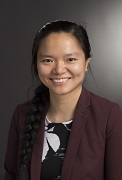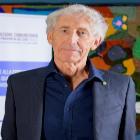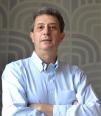Speaker Spotlight
Published: 22 August 2024
We are delighted to announce our line up of keynote speakers and Public Lecture Speaker for the 7th Soft Tissue workshop to be held at Politecnico di Milano. Alfio Quarteroni will give the public lecture Linwei Wang, Santi Trimarchi, Guglielmo Lanzani, Jose F Rodriguez-Matas and Alain Goriely complete the line up of keynote speakers.
Speaker Spotlight: Linwei Wang " Learn-to-Personalize with Hybrid Models: Theory, Methods, and Applications" on June 11th 9.30am
Dr Linwei Wang is a Professor of Computing and Information Sciences at the Rochester Institute of Technology (RIT) in Rochester, NY. She is also the Director of the Personalized Healthcare Technology (PHT180) Research Center at RIT that consists of over 120 faculty affiliates across nine colleges at RIT. Dr. Wang directs the Computational Biomedical Lab at RIT, with core research interests centered around statistical inference, Bayesian deep learning, and inverse problems with applications to signal and image analysis in a variety of domains including healthcare, astrophysics, and material design. Dr. Wang is a recipient of the NSF CAREER Award in 2014 and the United States Presidential Early Career Award for Scientists and Engineers (PECASE) in 2019. Dr. Wang currently serves as the Executive Secretary on the Board of the Medical Image Computing and Computer-Assisted Intervention (MICCAI) Society.
faculty affiliates across nine colleges at RIT. Dr. Wang directs the Computational Biomedical Lab at RIT, with core research interests centered around statistical inference, Bayesian deep learning, and inverse problems with applications to signal and image analysis in a variety of domains including healthcare, astrophysics, and material design. Dr. Wang is a recipient of the NSF CAREER Award in 2014 and the United States Presidential Early Career Award for Scientists and Engineers (PECASE) in 2019. Dr. Wang currently serves as the Executive Secretary on the Board of the Medical Image Computing and Computer-Assisted Intervention (MICCAI) Society.
Dr. Wang obtained her BS degree in Optic-Electrical Engineering from Zhejiang University (China) in 2005, her M.Phil degree in Electronic and Computer Engineering from Hong Kong University of Science and Technology in 2007, and her PhD in Computing and Information Sciences from RIT prior to joining the faculty of RIT in 2009.
Speaker Spotlight: Santi Trimarchi "Surgery and modelling a winning marriage" on June 11th 2pm
Prof. Santi Trimarchi is Full Professor of Vascular Surgery at Università degli Studi di Milano and he is Head of the Vas cular Surgery Unit at Fondazione IRCCS Ca’ Granda Ospedale Maggiore Policlinico in Milan (Italy).
cular Surgery Unit at Fondazione IRCCS Ca’ Granda Ospedale Maggiore Policlinico in Milan (Italy).
Over 30-years of career his clinical-surgical and research activity has been focused on the study and treatment (with both open and minimally invasive endovascular techniques) of aortic diseases, including primarily aneurysms and dissections, but also of many other vascular diseases such as carotid stenosis, arteriopathies of the lower limbs and superficial and deep venous pathologies.
His commitment to research over the years brought him to cover the Pi or Co-PI position, in several international studies and registries.
To date he has performed more than 4000 operations. He authored (or co-authored) more than 370 scientific publications on international peer-reviewed journals.
From 2017 he is a committee member of the European Society of Vascular Surgery (ESVS) for the extension of the guidelines on Thoracic Aortic Diseases.
From 2020 he is a committee member of the European Society of Vascular Surgery (ESVS) for the extension of the guidelines on Abdominal Aortic Diseases and also a member of the ESVS guidelines steering committee.
From 2022 he is a committee member of the Italian Society of Vascular Surgery (SICVE) for the guidelines on Thoracic Aortic Diseases.
From 2024 he is a member of the writing committee of The European Association for Cardio-Thoracic Surgery/The Society of Thoracic Surgeons (EACTS/STS) Guidelines for Diagnosing and Treating Acute and Chronic Syndromes of the Aortic Organ.
Alain Goriely: "Modelling cerebrovascular pathology and amyloid beta spreading in Alzheimer’s disease" on June 12th 9am
Alain Goriely is a mathematician and scientist with a broad range of interests in mathematical methods, mechanics, sciences, and engineering. He is particularly renowned for his contributions to the field of solid mechanics, both fundamental and applied, and for developing a mathematical theory of biological growth, which he explores in d etail in his monograph "The Mathematics of Mechanics in Biological Growth".
etail in his monograph "The Mathematics of Mechanics in Biological Growth".
Goriely earned his PhD from the University of Brussels in 1994, where he later became a lecturer. In 1996, he joined the University of Arizona and established a research group within the highly regarded Program of Applied Mathematics. In 2010, he took up a position at the University of Oxford as the inaugural Statutory Professor of Mathematical Modelling and Fellow of St. Catherine's College. He currently serves as the Director of the Oxford Centre for Industrial and Applied Mathematics.
In addition to his academic work, Goriely is also active in scientific outreach, sharing his insights and findings on a variety of topics related to his research, including tendril perversion in plants, twining plants, umbilical cord knotting, whip cracking, the shape of seashells, and brain modelling. For his contributions to mathematics and sciences, Goriely was elected as a Fellow of the Royal Society in 2022 and received the SES medal of Engineering in 2024.
Jose F Rodriguez-Matas: "On inverse elasticity methods for anisotropic hyperelastic materials.” on June 12th 2pm
Dr. José F. Rodríguez Matas is a Professor of Biomedical Engineering at Politecnico di Milano (POLIMI) and leads the LaBS-Computational Biomechanics Laboratory (LaBS-CompBiomech) in the Department of Chemistry, Materials, and Chemical Engineering "Giulio Natta" at POLIMI, with a primary research focus on in silico medicine, with a particular emp hasis on both the verification and validation of developed models, as well as the quantification of uncertainties. His research includes the development of theoretical and computational models for complex nonlinear materials and systems, with applications to living tissues and medical device–tissue interactions. Additionally, he is interested in the modeling and simulation of multiphysics problems, particularly in computational electrophysiology.
hasis on both the verification and validation of developed models, as well as the quantification of uncertainties. His research includes the development of theoretical and computational models for complex nonlinear materials and systems, with applications to living tissues and medical device–tissue interactions. Additionally, he is interested in the modeling and simulation of multiphysics problems, particularly in computational electrophysiology.
Dr. Rodríguez earned his BSc in Mechanical Engineering from Universidad Simón Bolívar (Venezuela) and his PhD in Mechanical Engineering from the University of Notre Dame (USA) in 1999. He worked at Universidad Simón Bolívar from 1999 to 2003. In 2003, he was awarded a Ramón y Cajal Research Fellowship (Spain) and moved to Universidad de Zaragoza (Spain), where he became an Associate Professor in 2011. He joined the faculty of POLIMI in 2015.
Alfio Quarteroni: "Which role for computational scientists in the era of artificial intelligence?" on June 12th 6pm
Alfio Quarteroni is an Emeritus Professor at both the Politecnico di Milano (Italy) and EPFL, Lausanne. At EPFL, he directed the Chair of Modelling and Scientific Computing from 1998 to 2017. He founded MOX at the Politecnico di Milano in 2002, serving  as its first director until 2022, and established MATHICSE at EPFL, leading it from 2010 to 2015. He also co-founded MOXOFF, a spin-off company of the Politecnico di Milano, where he currently serves as President.He is a member of several prestigious academies, including the Accademia Nazionale dei Lincei, the European Academy of Science, Academia Europaea, the Lisbon Academy of Science, and the Italian Academy of Engineering and Technology. In 2022, Research.com ranked him 1st in Italy among the Top Mathematics Scientists.
as its first director until 2022, and established MATHICSE at EPFL, leading it from 2010 to 2015. He also co-founded MOXOFF, a spin-off company of the Politecnico di Milano, where he currently serves as President.He is a member of several prestigious academies, including the Accademia Nazionale dei Lincei, the European Academy of Science, Academia Europaea, the Lisbon Academy of Science, and the Italian Academy of Engineering and Technology. In 2022, Research.com ranked him 1st in Italy among the Top Mathematics Scientists.
Professor Quarteroni has authored 25 books, edited 12 volumes, and published over 400 papers in international scientific journals and conference proceedings. He serves on the editorial board of 25 international journals and is the Editor-in-Chief of two book series published by Springer. He has delivered over 300 invited or plenary talks at international conferences and academic institutions, including the International Congress of Mathematicians in Beijing in 2002 and in Madrid in 2006.
Throughout his career, he has received numerous awards and honors. In 1992, he was awarded the NASA Group Achievement Award for his pioneering work in Computational Fluid Dynamics. Other distinctions include the Ghislieri Prize in 2013, the International Galileo Galilei Prize for Sciences in 2015, the Euler Lecture in 2017, the ECCOMAS Euler Medal in 2022, the ICIAM Lagrange Prize in 2023, and the Blaise Pascal Medal in Mathematics in 2024, awarded by the European Academy of Sciences.
His contributions have also been recognized through two ERC Advanced Grants, the Galileian Chair from Scuola Normale Superiore in Pisa in 2001, and an honorary doctorate in Naval Engineering from the University of Trieste in 2003. He has been a SIAM Fellow since 2009, an IACM Fellow since 2004, and an honorary member of ECMI. Additionally, he was a member of the Fields Medal Committee in 2022.
His research spans mathematical modeling, numerical analysis, and scientific computing, with applications in fluid mechanics, geophysics, medicine, and sports performance optimization. His team at EPFL contributed to the preliminary design of Solar Impulse, the Swiss long-range experimental solar-powered aircraft project, and played a key role in optimizing the performance of Alinghi, the yacht that won the America’s Cup in 2003 and 2007.
Guglielmo Lanzani: “intra membrane molecular phototransducers for muscle cell stimulation” on June 13th 12.10
Guglielmo Lanzani is a physicist. Full professor at Politecnico di Milano, he has served from 2010 to 2023 as Director of the Center for Nano Science and Technology at Italian Institute of Technology, where he is senior researcher. He studies photoresponsive materials able to induce light sensitivity and signaling biological sy stems. The ultimate goal is to realize photo-driven human-machine interfaces for application in regenerative medicine, prosthetics and hybrid robotics. He has recently developed, in collaboration with neuroscientist and medical doctors, a new retina prosthesis that exploit semiconducting polymer nanoparticles for rescuing vision in photodetector-degraded retinas. He is a funding partner in two start-ups (NOVAVIDO and SAMS Technology).
stems. The ultimate goal is to realize photo-driven human-machine interfaces for application in regenerative medicine, prosthetics and hybrid robotics. He has recently developed, in collaboration with neuroscientist and medical doctors, a new retina prosthesis that exploit semiconducting polymer nanoparticles for rescuing vision in photodetector-degraded retinas. He is a funding partner in two start-ups (NOVAVIDO and SAMS Technology).
First published: 22 August 2024
<< News

